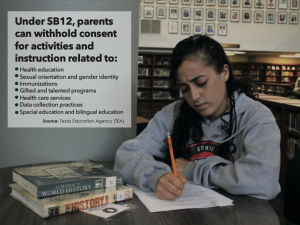As blood runs down your shin, staining your white socks, you politely ask your teacher for a band-aid, your teacher tells you they can’t give you one even though you clearly need one. Under the new Senate Bill 12 (SB12), students might no longer be able to receive first aid from teachers or the nurse, join clubs, or talk to their counselors about issues outside of academic guidance without written permission from home.
According to KCEN-TV, Senate Bill 12 (SB12), which took effect on September 1, requires parental consent for a wide range of school services and activities. The Texas Education Agency (TEA) defines services as anything from basic first aid to comprehensive counseling services. Parents must now opt in for these services for their child to receive them.
“I think that the parents who have already opted in for services for their kids were already previously involved in those decisions and overall Bowie has high parent involvement,” lead counselor Nicole Hepburn said. “From my understanding of the bill, without parent consent, our job remains strictly academic counseling, so we can communicate with students about grades, college, career stuff, scheduling issues, and anything related to that.”
According to the Garland Independent School District (GISD), the TEA has distinguished which services are opt-in, meaning consent must be provided before the service is given, and which services are opt-out, meaning consent is assumed unless a parent declines. Regarding counselor services, parents must opt-in for any time of psychological treatment or therapy. Other services such as mental health, suicide prevention and other services offered that align with decisions made by the local school health advisory are provided no matter what unless a parent specifically opts-out.
“If I’m having a conversation with a student and it starts to become a conversation about mental health and we don’t have parental consent, I would have to tell that student sorry until their parent gives consent can’t have this conversation,” Hepburn said. “We’ll usually call the parent then, but until the parent signs consent we can only listen to the student, we can’t provide any support or advice.”
Services provided by the nurse, things as simple as general care-taking (bloody noses, checking temperature, bandages) and care in an emergency situation will always be provided when needed, according to AISD. Additionally, counselors are allowed to provide emergency services such as suicide risk prevention, immediate crisis support and others listed in SB12, regardless of consent.
“Yes, parents should be involved in their child’s mental health, but ultimately it should be up to the child to reach out and be able to get those resources,” senior Abby Laine said. “This bill is not beneficial or needed, and it takes away from what we need, which is more conversations about mental health.”
As stated by the TEA, the current wording of the bill is still considered a draft that is actively being updated until it gets sent out to the public in the final steps of the process. Once it’s published as a proposed rule, the public is allowed to submit a public comment where the committee will discuss the comment and decide if they agree to edit the rule or not. Each school has made their own decision on how they will send out forms for parents to sign to give consent for various services. Bowie has decided to create separate Google Forms for

each service provided by the school; counseling, the nurse and club/ extracurricular permissions and send those out to families.
“When I have a student come in wanting to talk to me but the consent form isn’t signed, I ask the kid if they knew that their parents needed to sign the form for us to have this conversation,” Hepburn said. “In the couple of times that a parent hasn’t signed, I ask the kid if they want to call their parent and ask them to sign it, and usually the parent signs it within a couple of minutes. I just think that having to stop the conversation to see if I even have permission to talk to the student is taking time out of my day that I could be using to talk to more students.”
According to KCEN-TV, this bill comes during a time when schools are facing increasing mental health challenges among students. In a 2022 study from the National Library of Medicine, only about 38% of children who met the criteria for a mental health diagnosis were believed to need help by their parents. Laine feels that parents may not be aware of when their child is struggling, and with this new law, students who are struggling might be overlooked.
“I would be afraid to talk to my counselor if I knew my parents didn’t want me to because I wouldn’t know what I would be allowed to talk about with my counselor because of the law,” Laine said. “I think this bill could impact student-teacher dynamics, and I feel like it might make students feel less welcome on campus.”
As mentioned in an article by GISD, parents are now required to provide consent before their child joins any district-sponsored clubs. All extracurricular activities are reviewed to ensure they comply with state laws and district policies. Until parental consent is given students may not participate in any extracurricular activities, which include academic clubs, service organizations, and sports teams.
“This bill will inherently allow for parents to intervene with what their child is participating in, but it doesn’t stop kids from wanting to be involved or do that activity outside of the paperwork,” senior Amelie Baker said. “I may be wrong, but I think that this bill could target students who are underprivileged or facing emotional dilemmas at home.”
According to Texas AFT, SB12 is part of a broader effort by Gov. Greg Abbott to reshape public school practices related to parental rights, educator responsibility, and the role of diversity and identity in pre-K-12 schools. This bill prevents school districts from assigning employees, contractors or volunteers any responsibilities that fall under the law’s definition of diversity, equity, and inclusion (DEI). SB12’s definition of DEI includes but not limited to, hiring based on race, sex or ethnicity, promoting different treatment based on those factors, and developing or implementing training or programs that reference race or ethnicity.
“This bill is stupid, mental health is very important and that’s why mental health services should be automatically offered as a resource and students don’t have to use it if they don’t want to,” Laine said. “I feel like this bill will impact LGBTQ communities, because a lot of students who are a part of that community reach out to their teachers who they know will be very supportive towards them.”
SB12 also addresses what is called “social transitioning.” This requires school employees to use name and gender expressions that align with what the student was assigned at birth. SB12 also requires districts to have teachers provide course syllabus or instructional plans before each semester starts, requires written parent consent at least 14 days before human sexuality instruction, prohibits instruction or guidance related to sexual orientation or gender identity and prohibits districts from authorizing or sponsoring clubs organized around sexual orientation.
“It’s very common for students to feel scared to talk to staff, or be a part of certain programs because it can lead to parental involvement before the student is ready for that,” Baker said. “If the state is going to put this much pressure on a school system to be responsible over the kids that are present then they also have to embrace the positive of going to school which is that students have a home away from home. By passing this bill you are separating students from teachers which doesn’t make the job any easier.”








